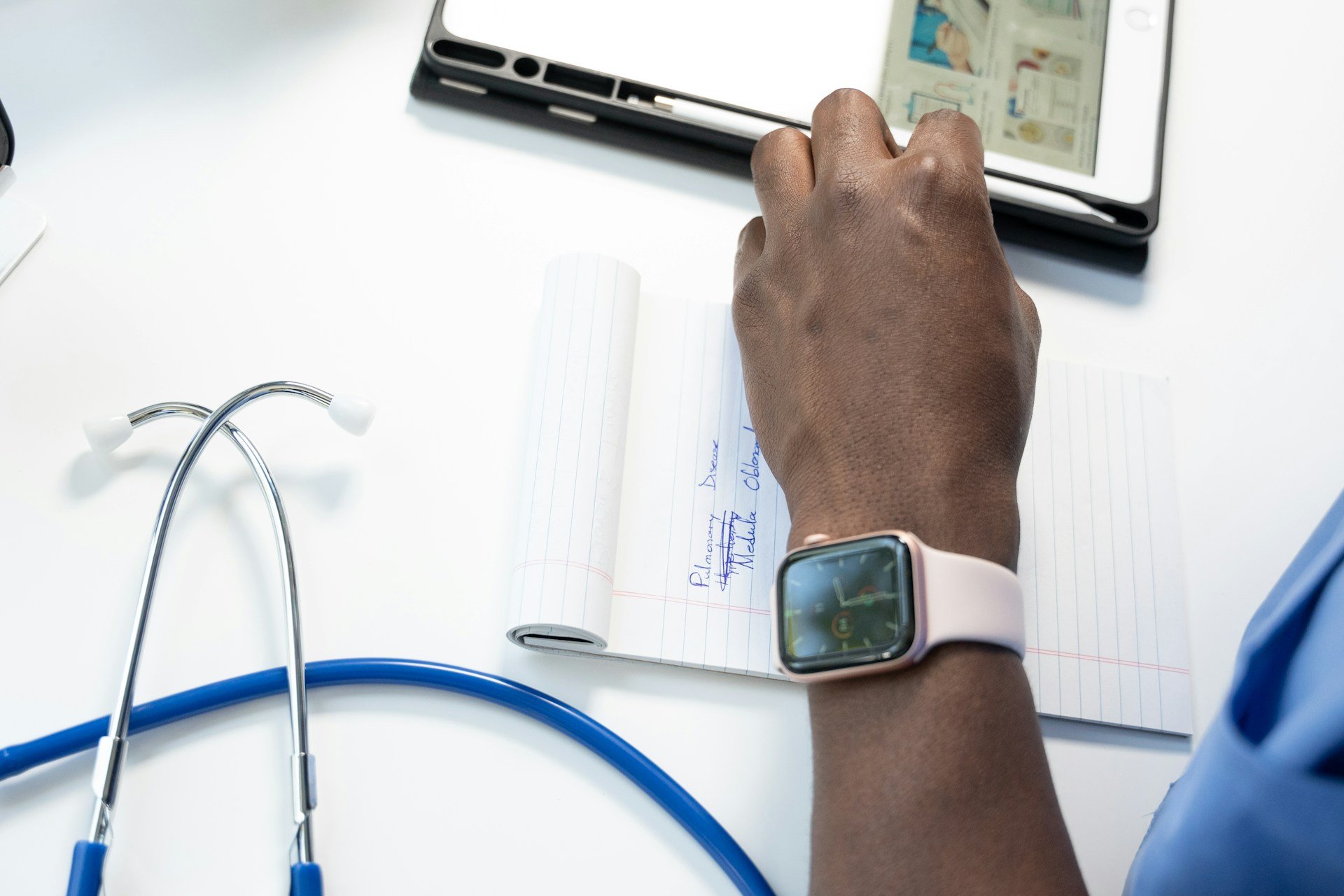Enhancing Patient Care: Exploring the Role of Digital Biomarkers in Patient-Centric Healthcare

In recent years, the healthcare industry has witnessed a rapid evolution in the way patient care is delivered. One of the key advancements that has gained significant attention is the use of digital biomarkers in patient-centric healthcare. Digital biomarkers refer to the objective, quantifiable physiological and behavioural measures that are collected through digital devices, such as wearables, sensors, and mobile apps. These biomarkers provide valuable insights into the patient's health status, allowing healthcare providers to deliver personalized and proactive care.
What are digital biomarkers?
Digital biomarkers, a pioneering concept in healthcare, utilize digital technologies to capture and analyse a wide spectrum of health-related data, spanning from fundamental metrics like heart rate and sleep patterns to intricate variables such as gait and speech patterns. These biomarkers provide real-time insights into an individual's health, enabling early disease detection, treatment assessment, and data-driven healthcare decisions. Their continuous monitoring nature offers a dynamic perspective on health trends.
These biomarkers extend their impact beyond individual patient care, serving as a valuable resource in research, clinical trials, and population health management. By aggregating and analysing data from large cohorts, researchers gain profound insights into disease trends, treatment effectiveness, and health factors. Digital biomarkers signify a transformative shift in healthcare, offering a holistic view of health and empowering personalized, data-informed medical interventions.
The role of digital biomarkers in patient care
Digital biomarkers play a crucial role in transforming patient care from a reactive approach to a proactive and patient-centric model. Traditionally, healthcare has been centred around episodic visits to healthcare providers, where patients are assessed based on their symptoms and medical history. However, with the advent of digital biomarkers, healthcare providers can now monitor patients remotely and gain a deeper understanding of their health on a continuous basis.
By leveraging digital biomarkers, healthcare providers can identify patterns and trends that may indicate potential health issues even before symptoms manifest. For example, changes in heart rate variability and sleep patterns can provide early indications of cardiovascular diseases and mental health conditions, respectively. This early detection allows for timely interventions, preventing the progression of diseases and improving patient outcomes.
Benefits of using digital biomarkers in healthcare
The integration of digital biomarkers in patient care brings forth numerous benefits for both patients and healthcare providers. Firstly, digital biomarkers enable remote patient monitoring, allowing individuals to receive care in the comfort of their own homes. This not only reduces the burden on healthcare facilities but also enhances patient convenience and engagement in their own healthcare journey.
Secondly, digital biomarkers provide objective and quantifiable data that can be used to track the effectiveness of treatments and interventions. By continuously monitoring biomarkers, healthcare providers can make data-driven decisions and adjust treatment plans in real-time, leading to more personalized and effective care.
Furthermore, digital biomarkers have the potential to improve clinical trials and drug development processes. By capturing real-world data from patients outside of clinical settings, researchers can gain a deeper understanding of the effectiveness and safety of new treatments. This can speed up the development of innovative therapies and increase the chances of successful outcomes.
Challenges and limitations of digital biomarkers
While the use of digital biomarkers holds great promise, it is not without its challenges and limitations. One of the key challenges is the need for robust data privacy and security measures. With the collection and storage of sensitive health data, it is crucial to ensure that patient information is protected from unauthorized access and breaches.
Another challenge is the interoperability of digital biomarkers with existing healthcare systems. The integration of digital biomarkers into electronic health records and other healthcare platforms requires standardized protocols and seamless data exchange. Without proper interoperability, the full potential of digital biomarkers may not be realized.
Additionally, the accuracy and reliability of digital biomarkers need to be validated through rigorous scientific studies. While technological advancements have improved the accuracy of wearable devices and sensors, there is still a need for further research to ensure the reliability of the collected data for clinical decision-making.
Identifying and measuring digital biomarkers
Identifying and measuring digital biomarkers require a multi-disciplinary approach involving healthcare providers, data scientists, and technology experts. The first step is to define the specific biomarkers that are relevant to a particular health condition or objective. This involves understanding the underlying physiology and behaviour associated with the condition and determining the appropriate digital signals to capture.
Once the biomarkers are identified, the next step is to develop and validate the measurement methods. This may involve the use of wearable devices, smartphone applications, or other sensing technologies. It is important to ensure that these devices are accurate, reliable, and user-friendly to encourage patient adherence and engagement.
Furthermore, the data collected from digital biomarkers need to be processed and analysed to extract meaningful insights. This often requires advanced algorithms and machine learning techniques to identify patterns, trends, and anomalies in the data. The integration of artificial intelligence and data analytics is crucial in transforming raw data into actionable information for healthcare providers.
Examples of digital biomarkers in patient-centric healthcare
Digital biomarkers are transforming patient-centric healthcare by offering valuable insights and enabling timely interventions. In the realm of mental health, companies like the defunct Mindstrong Health have harnessed digital biomarkers like speech patterns and typing speed to assess individuals' mental well-being. These biomarkers facilitate the early detection of conditions like depression and anxiety, enabling healthcare providers to deliver timely support and care.
Chronic disease management has witnessed the powerful impact of digital biomarkers. In diabetes care, companies like Dexcom have pioneered continuous glucose monitoring devices that provide real-time data on blood sugar levels. This technology empowers healthcare providers to make immediate adjustments to medication dosages and lifestyle recommendations, improving patient outcomes.
Cardiology has also seen notable advancements with digital biomarkers. Innovations by companies like AliveCor have leveraged heart rate variability and electrocardiogram (ECG) signals to gain insights into cardiovascular health. These biomarkers enable the early detection of heart function irregularities, allowing healthcare providers to intervene proactively and prevent severe complications.
These real-world examples illustrate the transformative potential of digital biomarkers in enhancing patient care across various healthcare domains. By harnessing these technologies, healthcare providers can deliver more personalized, effective, and timely interventions, ultimately improving patient outcomes and quality of life.
Integrating digital biomarkers into healthcare systems
The successful integration of digital biomarkers into healthcare systems requires collaboration between healthcare providers, technology companies, and regulatory bodies. Firstly, healthcare providers need to embrace the use of digital biomarkers as part of their standard practice. This involves training healthcare professionals on the interpretation and utilization of digital biomarker data in clinical decision-making.
Secondly, technology companies play a crucial role in developing user-friendly and accurate devices and applications for capturing digital biomarkers. These companies need to ensure that their products adhere to regulatory standards and undergo rigorous testing to validate their accuracy and reliability.
Lastly, regulatory bodies need to establish clear guidelines and frameworks for the use of digital biomarkers in healthcare. This includes addressing issues related to data privacy, security, and interoperability. By providing a regulatory framework, healthcare providers and technology companies can navigate the complex landscape of digital biomarkers with confidence.
The future of digital biomarkers in patient care
The future of digital biomarkers in patient care is promising, with advancements in technology and data analytics paving the way for more personalized and precise healthcare. As wearable devices become more sophisticated and affordable, the adoption of digital biomarkers is expected to increase, enabling individuals to take an active role in managing their health.
Furthermore, the integration of artificial intelligence and machine learning algorithms will enhance the capabilities of digital biomarkers in detecting subtle changes and predicting health outcomes. This will enable healthcare providers to deliver proactive and preventive care, reducing the burden of chronic diseases and improving overall population health.
In conclusion, digital biomarkers are revolutionizing patient-centric healthcare by providing objective and continuous insights into a patient's health status. By leveraging these biomarkers, healthcare providers can deliver personalized and proactive care, leading to improved patient outcomes. However, the integration of digital biomarkers into healthcare systems comes with challenges and limitations that need to be addressed. With collaboration between healthcare providers, technology companies, and regulatory bodies, the future of digital biomarkers in patient care holds great potential for transforming the way healthcare is delivered.
Stay informed about the latest in biomarkers! Subscribe to our newsletter for exclusive updates and expert insights







